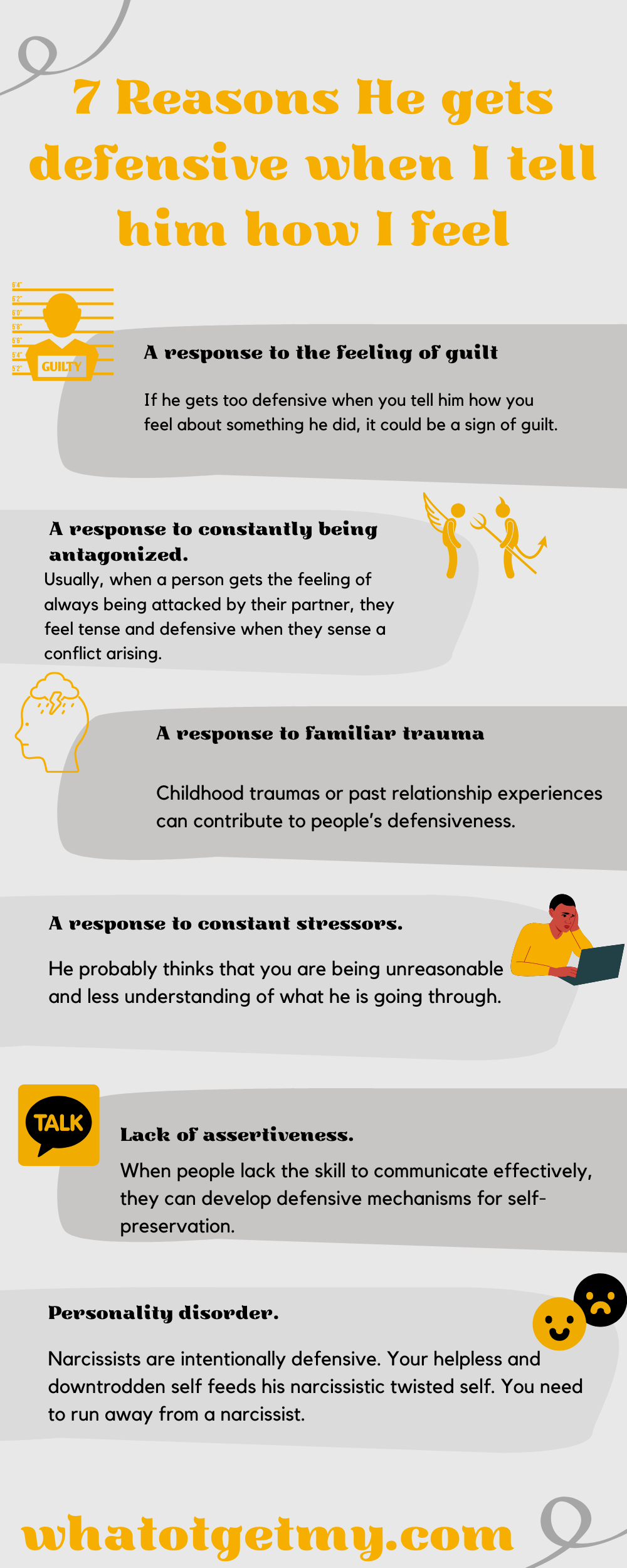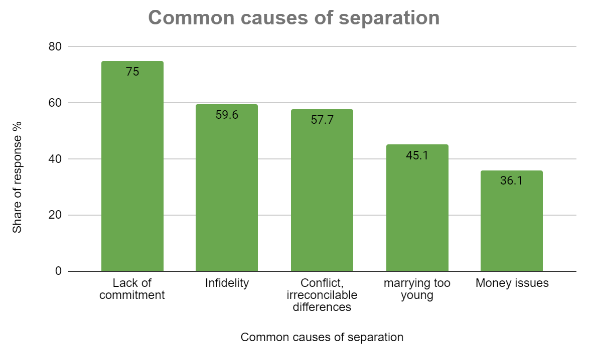7 Reasons He gets defensive when I tell him how I feel
WhatToGetMy Instructional Article
- A defensive boyfriend or husband is like a porcupine with emotions on steroids. It's hard to have a heartfelt conversation with them without their sharp quills flaring up and ready to prick you. But have no fear. If he gets defensive when you tell him how you feel, we know why and what you should do to get through to him.

“A defensive boyfriend or husband is like a porcupine with emotions on steroids.”
It’s hard to have a wholesome conversation with a defensive husband who denies wrongdoing, gaslights, blames, generalizes, or gives silent treatment. Their defensive behaviors usually stir the feeling of anger, resentment, loneliness, doubts, and dissatisfaction in their partners. In many cases, defensive people hardly enjoy healthy and lasting relationships because their partners find them unbearably immature. Who wants to spend their lives with someone that gives them the feeling of walking on shells?
The problem with defensive boyfriends or husbands is that they deny themselves the chance to resolve issues on time before it ruins their relationships. They deny themselves the chance to self-develop or become better people in their relationships. They also make their partners feel terrible and make situations worse than they should have been. The outcome of their defensiveness makes them an outcast since people consider them to be difficult to relate to.
Fun Fact: Irreconcilable differences (defensiveness) is one of the early predictors of separation.

Source: gottman.com

Source: itsovereasy.com
The truth is, defensiveness is a sign of emotional immaturity. Dr, Less Carter says that psychologically healthy people can disagree with people agreeably. In other words, normal people should be able to acknowledge other people’s perspectives or ideas without feeling conflicted about who they are or what they consider to be truthful. Psychologically healthy people can handle criticism better than defensive people.
It is said that defensiveness is a reflection of people’s vulnerability. Excessively defensive people feel more vulnerable than others. If your husband is always defensive during conflicts or conversations, it is a sign that he has unresolved issues in his life that is making him feel vulnerable. You can choose to actively participate in the process of resolving those unresolved issues or sit at the sideline and judge him till you muster the courage to leave the relationship or block out his defensiveness.
Why is he defensive when I tell him about my feelings?
According to experts, there are a couple of reasons a partner would act too defensive, and we’ve listed just seven. Be sure it isn’t the seventh reason.
A response to the feeling of guilt.
If he gets too defensive when you tell him how you feel about something he did, it could be a sign of guilt. He knows you are right but doesn’t want to admit it and gets defensive. He probably doesn’t want you to have any leverage you could use against him in the relationship. Secondly, it would hurt his bloated ego to admit to being wrong. He doesn’t see how admitting what you say would benefit him in the relationship.
A response to constantly being antagonized.
Usually, when a person gets the feeling of always being attacked by their partner, they feel tense and defensive when they sense a conflict arising. Their defensive behavior is a way of shielding their ego/ self-esteem from being dashed by their partner. Believe it or not, it stings more when the person closest to you makes you feel unworthy because they are too critical of you.
If you feel like your defensive husband doesn’t understand how you feel, it could be that he is tired of being attacked/ heavily criticized by you. This also means that there are some unresolved issues in your marriage. He is bearing a grudge against you over something you may have said or done in the past.
A response to familiar trauma
Childhood traumas or past relationship experiences can contribute to people’s defensiveness. If your partner grew up in an environment where he was constantly judged or criticized, or in a relationship where he always felt victimized, his defensiveness could be rooted in these experiences. Your approach to conflict resolution could act as a trigger to these familiar traumas. He instinctively becomes defensive about feeling safe.
Your boyfriend’s defensive behaviors do not necessarily mean that he hates or has no regard for you. He might even be unaware of why he is impulsively defensive. In this situation, psychologists recommend that you pay attention to his behavior during and after the conflict. Also, try a different approach in your communication.
A response to constant stressors.
If your boyfriend or husband gives you the silent treatment, withdraws, and acts mean or rigid when you share your thoughts and feelings on certain issues, it could be that he has many stressors and doesn’t want to deal with you. He probably thinks that you are being unreasonable and less understanding of what he is going through. His defensive behaviors could be a cry for peace and sanity in his life. He is trying to avoid having conflict with you.
A response to the feeling of helplessness.
The fifth reason he gets defensive when you tell him how you feel could be that he is well aware of the problem but finds himself trapped and unable to address your complaint immediately. Since he feels helpless and knows you won’t stop complaining about the issue, he’ll continue to gaslight, ‘yah, but’, and give you the silent treatment.
Lack of assertiveness.
When people lack the skill to communicate effectively, they can develop defensive mechanisms for self-preservation. People who lack assertiveness use the silent treatment as a defense mechanism.
Personality disorder.
If you feel he’s too defensive to see reasons with you, he could have a personality disorder. For example, he could be a narcissist. Narcissists are intentionally defensive. Your helpless and downtrodden self feeds his narcissistic twisted self. You need to run away from a narcissist.
What can I do when my husband is too defensive?
Regardless of his reason for being defensive, it doesn’t change the fact that his approach to conflict management in the relationship is not helping both of you. His defensive behaviors are causing more rifts in the marriage, and if nothing is done in the nick of time, it could be the death of the relationship.
To resolve your dilemma, adopt a different approach when communicating with him. Below are several recommendations from family counselors and psychologists.
Self-evaluate before and affect communication
The first step to improving the quality of your interaction with your husband is to evaluate how you interact with him continuously. By self-reflecting, you become more attentive to your actions, feelings, and behavior to avoid enabling his defensive behavior. The three important areas to pay attention to when you self-reflect are;
Your mood:
Your mood can affect how you deliver your message. It can affect your choice of words, tone, aura, and expressions. When you try to address issues in a terrible mood, there are high chances you would use a poor choice of words or tone of voice. Ask yourself; have I tried to resolve issues when I am angry? Did my mood play a role in influencing the outcome of the discussion?
Your desire to be in control
Ask yourself whether you’ve been domineering or controlling in the relationship. When people are in the habit of being bossy, those on the receiving side tend to be defensive. If you are the type of woman that wants things to be done a certain way, you’ll make your boyfriend or husband tired of you. Allow your partner the freedom to do things how he wants so far it doesn’t endanger you or affect your life directly. Stop telling him what to do all the time.
Your body language
Your body language goes hand in hand with your mood. Your mood could influence your body language. When your body language sends an attack signal to the recipient, they immediately become defensive. Ask yourself whether you point at him with your finger during arguments, fold your fists at his responses, bang on something, throw pillows, shove things aside, or walk away during discussions. You could be enabling his defensive behaviors if you portray aggressive body language during conflicts.
Stop being shocked by his defensiveness.
Expecting him not to be defensive when you already know he is a defensive person will keep you disappointed. But when you accept that he has a flaw which is ‘being defensive’, you reduce how disappointed you get.
Be more encouraging and less critical.
The best way to get him to lower his defenses is to make him feel safe during discussions. The more he associates you with being encouraging, fun, and less critical, the more comfortable he is discussing anything with you. Appreciate him for the things he does right more than you criticize him for what he does wrong.
Make requests instead of giving orders.
When you parent an adult, they’ll find it insulting and pushback. Instead of pointing out what he isn’t doing, nagging him about it, or even scolding him, ask him to do things you want him to do politely. For example, if he forgot to put back the milk in the fridge after using it and you find that the milk is almost sour. Don’t scold or lash out. You could say. ‘Babe, I think the milk is almost sour; please do not forget to put it back in the fridge next time.’ The tone of voice you use is most important when conveying any message.
Listen more and react less.
When he gets defensive and you feel mad, remind yourself to be calm and hear all he has to say. Your patience and attentiveness will help you ask objective questions instead of emotional questions. Don’t allow him to lure you into his defensive tactics. It will take you away from the main topic being discussed. Exercise more patience when handling misunderstandings.
Talk to him about his defensiveness and how it affects you.
You don’t have to bottle your emotions in your relationship; it will make you resentful and bitter. You should speak up and seek help. Choose a friendlier approach if you decide to address his defensiveness. Criticism is hard to swallow for anyone. It yields more results when it is served without harsh judgments.
Seek to understand where his defensiveness stems from.
While you work on your approach to conflict management, pay attention to other factors that could be triggering his defensive behaviors. It could be unresolved childhood issues or past relationship experiences. Provide a safe space where he could talk about his life freely.
Ask him for appraisals.
Ask your husband for appraisals. He should be free to talk to you about behaviors he likes and dislikes. His assessment could improve the quality of your interaction. Secondly, he’ll understand that you don’t intend to attack him.
Seek counseling.
Your defensive husband needs to see a therapist to resolve whatever issues might be triggering his defensiveness. He needs to seek ways to regain his self-esteem and deal away with the feeling of vulnerability.
Frequently Asked questions
Why is he defensive when I tell him about my feelings?
- He has a personality disorder.
- He feels guilty and uncomfortable with the discussion.
- He feels antagonized by your approach.
- He doesn’t know how to communicate his stance effectively. He lacks assertiveness.
- He has so many stressors and doesn’t want to add to it.
How can I get rid of my husband’s defensive attitude?
Change your approach to communication.
- Be attentive to your mood, body language, and desire to be in control.
- Appreciate him more and criticize him less. This will get him to lower his defense with time.
- Make requests instead of bossing him around.
- Be more attentive during conversations and less reactive. It will help you not to get lured into his defensive games.
- Stop being shocked by his defensiveness to reduce how often you get disappointed.
- Seek to understand where his defensiveness stems from
- Ask him for appraisals
- Speak to him about his defensiveness
- He needs to see a therapist.
Final words.
Defensiveness can ruin any relationship, but how you approach a conversation matters too. By improving your communication skill, you create a safe space that could encourage your defensive husband to lower his defenses. If you’ve tried different approaches and yet he remains defensive, it would be a good idea to refer him to a therapist or leave the relationship.
20 MINUTES
ESTIMATED TIME DESIGNING AND UPLOADING THIS ARTICLE
9 HOURS 55 MINUTES
ESTIMATED TIME RESEARCHING AND WRITING THIS ARTICLE
You Might Also Like

19 EXPERT ADVICE ON THE MOST COMFORTABLE CUDDLE POSITIONS
19 EXPERT ADVICE ON THE MOST COMFORTABLE CUDDLE POSITIONS WhatToGetMy Instructional Article Cuddling is a fine art. What does your physique look like in comparison to someone else’s? How does a furry companion prefer to cuddle up to you? Why are your kids’ feet rubbing

7 Amazing Birthday Party Ideas for a 70 Year Old Woman
7 Amazing Birthday Party Ideas for a 70 Year Old Woman WhatToGetMy Instructional Article She’s probably not hyped about celebrating her 70th birthday or maybe she is but either way, your mind is made up to make this milestone a memorable one for her. Well,

What to Do if the Cops Come to a Party: 5 Things to Do When the Cops Come to Your Party
What to Do if the Cops Come to a Party: 5 Things to Do When the Cops Come to Your Party WhatToGetMy Instructional Article You are having a good time with your friends and then ‘knock knock’, it is the police. Do not panic! There

7 + Top Romantic Bedroom Ideas For The Happy Couple (2022) We all crave a little more love in our lives, and there’s nothing better than romantic bedroom ideas to add some spark to that relationship. The most important task your bedroom has to accomplish

How to win Friends and Influence People
How to win Friends and Influence People WhatToGetMy Instructional Article This article is for you if you are worried about your non-existent social life and inability to make, sustain, and influence positive friendships. We’ve provided you with fundamental friendship-making tips to help win friends and

How Much to Spend on Wedding Dress: 11 Ways to Ensure You Get the Wedding Dress of Your Dream
How Much to Spend on Wedding Dress: 11 Ways to Ensure You Get the Wedding Dress of Your Dream WhatToGetMy Instructional Article The average amount spent on wedding dress in the united states of America is anywhere between $1,000-$8,000. These figures change depending on factors
Where to Rest Your Head in Salzburg: The Ultimate Neighborhood Guide
Where to Rest Your Head in Salzburg: The Ultimate Neighborhood Guide Planning a trip to Austria’s musical wonderland? Let’s figure out exactly where you should unpack your suitcase! Picture narrow cobblestone streets where Mozart probably spilled his coffee rushing to a concert—that’s Altstadt for you! This maze of medieval buildings and hidden courtyards feels like

11 Activities for Teenager with a Broken Leg
11 Activities for Teenager with a Broken Leg WhatToGetMy Instructional Article A study conducted in 2010 by the Center for Disease Control (CDC) showed that bone fractures accumulated the majority of Emergency Room visits with the numbers ranging between 3.5 to 4.4 million (the data

How to Make a Teenage Party Fun
1 Amazing Way to How to Make a Teenage Party Fun WhatToGetMy Instructional Article To make a teenage party fun will depend on a couple of important things. It will depend on the theme that you choose, the decorations, the music. And, of course, the

How to Ask For a Gift From Boyfriend
How to Ask For a Gift From Boyfriend WhatToGetMy Instructional Article My boyfriend never bought me a gift is a common sentence we hear these days. We don’t know why, but men have difficulties to just go to the store and buy a gift. It’s


